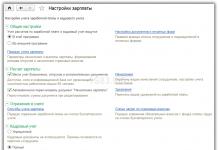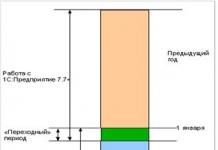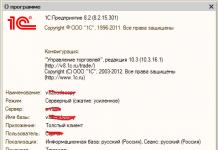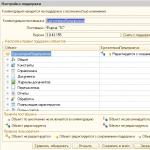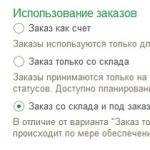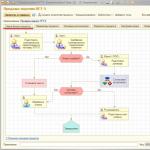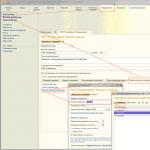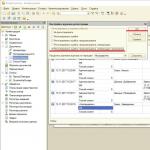OBJECTS OF PROPERTY are first of all (and initially) things (in the meaning of material objects of the world around us). Moreover, mainly in the form of objects of nature (one way or another isolated, “isolated”), as well as in the form of tools and results of a person’s activity (labor), means of his subsistence, life activity, objects of his activity, being, life.
In the broadest sense, as mentioned earlier, the category of "things" covers both the entire complex of plots of land, objects, mechanisms, devices that accompany each person in his daily life, and in modern conditions the whole variety of objects, mechanisms, devices that objectify technology. , technology, diverse world of information, nanotechnologies.
Of particular importance among natural objects are non-isolated (in the form of plots, allotments, licensed limited spaces) subsoil, which are recognized as the property of the whole society, as a rule, are an object of state ownership and can only serve as a prerequisite for providing objects within the corresponding plots of land, subsoil of the earth on on the basis of a license or other similar legal basis for possession and use, as well as disposal of the resulting products (fruits). Of fundamental importance here is the very fact of including the fruits of property in the composition of its organic objects. This circumstance, which is fundamentally important for understanding one of the main links of economic development in conditions of economic freedom, is one of the fundamental normative provisions on property enshrined in the Civil Code of France (and then in the corresponding normative acts of other countries). According to Art. 546 of this Code “the right of ownership to a thing, both movable and immovable, also extends to all income from its use, as well as to all its accessories, regardless of the natural or artificial nature of their attachment to the main thing”1. It is in the considered quality of property in
1 This quality of ownership, sometimes called the “right of accession,” has deep historical roots: it is embedded in the ancient Roman institution of “natural
Part one. General provisions
the real meaning of the “full right” that the owner has is revealed in many ways. And this just expresses the positive perspective of property as the basis of the economic and social life of people in modern times. The central point in the characterization of property in this perspective is the income from the use of property, which, according to the French Civil Code, as we have seen, is defined as the fruits of property, including
"industrial fruits" resulting from the production use of the object of ownership - things1.
With the development of commodity-money relations (and, to no lesser extent, the institutions and self-awareness of culture, including the culture of law), the range of property objects also included intangible benefits (including the honor and dignity of a person, which partly left extralegal relations, and partly combined with them ), and after that the objectified "accomplishments of creativity and reason".
First of all, it is somehow determined the results of the author, the inventor There are scientific discoveries (as well as means of individualization) that have become established as intellectual property over time (see Chapter Seven). In the modern era, the objects of property acquired the value of documentary or otherwise designated and recognized in the public domain.
documentary marks (marks of carriers) of such
objects and "accomplishments of creativity and reason", in particular - securities, including in the current conditions their "electronic fixators", in particular in non-documentary circulation2.
sheniya» (accessio), and most importantly - is the prerequisite for a wide and ramified range of legal relations; some of them became the initial legal prerequisite for the formation of entire branches of law (such as labor law, land law, subsoil legislation, etc.).
1 According to Art. 547 of the French Civil Code should distinguish between natural areas
dy (spontaneous results of land reproduction), industrial fruits (use of property in the production process), civil law fruits (rent, interest on a loan).
2 It has been argued in the literature that “it seems extremely important
treat with sufficient caution the recognition of the object of the right of ownership of securities. For, the author continues, here “the main value is nevertheless the right, and not paper as a thing” (Dozortsev V.A. Fundamental features of property rights in the Civil Code // Civil Code of Russia: Problems. Theory. Practice: Collection of Memory C A. Khokhlova / Editor-in-chief A. L. Makovsky, Moscow, 1998, p. 234). It seems that in this case V.A. Dozortsev did not take into account, as on the issue of intellectual property (see below, Chapter Seven), that along with the “paper” itself, a security is an expression and carrier of a special social reality that, in principle, can be
Even from very ancient times, the OBJECT OF OWNERSHIP has become, although secondary, not being a direct product of the productive sphere, but at the same time a “universal commodity” in all areas of life, being - money, money n a to i. With the economic development of society, money increasingly became an expression of the characteristics of property as “property”, “wealth” - in relation to each specific person, his condition. Moreover, with their characteristic features - a universal measure of value and a universal medium of circulation, and with specific legal properties - absolute equivalence, substitutability, divisibility, consumed character1.
Moreover, over time in society, especially directly in civil circulation, legal relations, the subject of which is money, not only separated into an independent branch of legal relations (monetary obligations as such or part of bilateral transactions), but also became a kind of legal source of a whole branch of peculiar property and legal relations, accompanied by the creation and rapid growth of banking, credit institutions, loan relations, lending and many others, connecting credit directly with commodity relations (such as leasing). In addition to other points, here we met with a phenomenon of a global nature, not yet sufficiently comprehended by the theory of property, with the fact that money in the capacity indicated above, especially in the conditions of a developed commodity-market economy, has largely blocked the traditionally understood “world of things”. And in this regard, concentrating in the form of carrier signs in banks and other credit institutions, they characterize the state of the economy, its development, crises, etc., as well as individual economic processes - cash flows, the state of people, commercial companies and countries, successes and economic failures. From this point of view, money, its acquisition, volume (state) have become one of the leading incentives for economic activity, an attractive center and an ideal of life - phenomena that are associated with social processes.
put on a par with the main object of property rights - things in the sense in which they are spoken of in this book.
1 See: Lunts L.A. Monetary obligation in civil and conflict law as
foodist countries. Moscow, 1948, pp. 14–15; Lavrov D.G. Monetary obligations in Russian civil law. SPb., 2001.
Part one. General provisions
sy, serving as a signal of the state of the economy, causing appropriate commercial assessments, alertness and anxiety.
A VERY SIGNIFICANT TURN in the very nature of ownership occurred after enterprises, commercial companies, including joint-stock companies, and other property complexes began to act as objects of ownership (and objects of relevant transactions - purchase and sale, lease, etc.).
A number of important features are revealed here, which for the most part make themselves felt when the right of ownership is transferred from one subject to another. The most significant of these features are the following two.
First of all, we are faced with really complexes that have the properties of systems, moreover, often organic
nature (although, for example, in relation to the enterprise as a whole - the nature of "organized aggregates"), covering heterogeneous elements. Including within the enterprise - real estate, "movable" property, including current and real money, intellectual property objects that individualize personalistic components, as well as, to a certain extent, what is called "personnel", its organizational structure.
From here, as it is more and more asserted in the literature, the need arises for management within the entire complex, which, according to a number of scientists, economists and jurists, determines the grounds for including property rights in the content along with the well-known
"triad" (rights of possession, use and disposal) and management as a special authority of the owner - a provision that, however, does not take into account the strength and wide range of the authority of the disposal and which, for this reason, can be perceived as a secondary, derivative authority (but not authority, which is on a par with the mentioned “triad”, which, as already mentioned, was noted with the utmost certainty by E.A. Sukhanov). True, for example, in joint-stock companies, all the components mentioned as “things” disappear, as it were, because in relation to each
1 See: Stepanov S.A. Real estate in civil law. Moscow, 2004, pp. 98–205; He is. Property complexes in Russian civil law. M., 2002, etc.
Ownership: problems of theory
to the house participant (shareholder) of the company, all - without a trace - his property is divided only and exclusively in the plane of its monetary expression, and only into shares that embody only obligations (claims) and some management powers belonging to shareholders. And if a certain “property trace” can be found in shares, then at present it concerns only each share as such, its significance as the possession of a property object (document), property protection, the possibility of alienation, and other transactions in this area. But be that as it may, from the organizational and economic side, the property complex of a joint-stock company still has a well-known structure, organizational and economic subdivision with the whole gamut of the above components. And the second. No matter how the human substratum of an enterprise or a commercial society is covered by the term “staff”, nevertheless, with a more detailed analysis, it turns out that in this case, a person is included in the circle of objects of property. And, therefore, complete domination, power, characteristic of property can be extended in enterprises and commercial societies not only to things, but also to people. Which in a number of positions throws the current legal order, characteristic of property, far back - to the era when a person could be put on a par with things "speaking
tools” or was the subject of wage slavery.
It would seem that a number of practically significant issues are resolved in this case with the help of public labor law imperatives (for example, by regulating employment relations, work and rest time, hourly wage requirements, etc.). But be that as it may, the employer remains the owner, and on the principle side, concerning the limits and imperativeness of the rights of the owner, which are traditionally unlimited in nature, complex problems arise.
For example, in March 2006, quite serious unrest among young people broke out in France due to the fact that the government established some rules for “first hire contracts”, according to which an employer under such a contract can dismiss an employee without giving reasons. The question may arise: what is special here? After all, the employer is the owner, and he seems to have the right, at his own discretion, without reporting to anyone, to decide on the suitability of a new employee, on his professional and moral qualities, avoiding any conflicts in such situations. But unrest among the youth, joined by prof-
Part one. General provisions
unions, took on such a massive, and partly "rebellious" character, that the government had to give in, go against the interests of the owner-employers and revise these rules.
Some of the issues related to this issue, on a number of points in accordance with the logic of theoretical issues of property rights, will be considered in the following chapters. However, one of them needs to be outlined, at least in the most general, staged form, already now (later we will see how important it is for understanding property and its development in the modern world).
THE ESSENCE OF THE MATTER IS THE FOLLOWING. Basically,
it is assumed that, with the exception of enterprises with an individual owner and a number of other cases, with a complex structure of the object of ownership, there is a plurality of participants in the relevant relations. As a rule, such structures are formed according to the type of "partnerships", "cooperatives", and other associations. At the same time, the participants in these relations largely remain owners from the point of view of property characteristics (as is typical for limited liability companies, a number of other partnerships and companies), including in relation to the statutory, warehouse
subsidiary capital of this company or partnership.
But among business companies there is one that is called a joint-stock company, where, according to the legislative wording, its participant remains the “owner” or even “owner”, but only in relation to a certain part of the entire capital of the company - a to q and d, into which the entire authorized society's capital. Moreover, it is subdivided in such a way that - and this is of fundamental importance - the rights of a shareholder lose their property character, they move into the category of relative (obligatory and partially managerial rights).
As if a trifle - a partial change in the status and profile of subjective rights.
In reality, as the author will try to show in the following presentation, here the gates open to a new world of property relations, which already initially largely break with the sphere of civil, private law and, moreover (let the following words be somewhat conditional), lead into a world unknown to law, to a large extent related to extra-legal property and power
and their role in society.
Ownership: problems of theory
AND ONE MORE POINT regarding property. Of course, with all the variety of objects of property in it, by its very nature, one thing remains unchanged. That which follows from its essence and which makes it possible to characterize property in relation to its subjects as their most (ultimately) complete, absolute possession and power over things, other objectified objects,
“bearer signs” (possession, use, disposal of them) and a person’s attitude towards them “as towards his own” is the same as towards himself.
At the same time, from the very first stages of civilization, some objects of property (property) acquired the significance of supreme property - church, royal, state, etc. This, as we shall see, also includes the type of joint-stock company property considered above.
These objects, in terms of their significance for state power, as well as for ideological reasons, have acquired supremacy and priority in the sphere of property and other social relations. And in connection with this - the unconditional inviolability of this kind of "supreme property", its inviolability in the strictest sense, its alienation from the population (citizens) and at the same time a special, privileged position, often (as was typical for state property in Soviet society ) special legal benefits. Including the presumption of state ownership of all disputed objects, unconditional, unlimited vindication of all property declared "state", etc.
Considering the very fact of exalting certain objects of property, one must see that this is in principle incompatible with the primordial nature of property, with the deep, human, truly democratic principles inherent in it from the very beginning.
§ 3. Objects of ownership
General provisions. In a market economy, the legislator's approach to determining the range of objects that may be owned by citizens has undergone fundamental changes. According to the previous legislation, the property of citizens, in accordance with its consumer purpose, was extended in a general way to consumer goods, and their number was often limited. As for the means of production, a citizen could be the owner of only small means of production, and their use with the involvement of hired labor, as a rule, was not allowed. Now the situation has changed radically. Starting with laws on property adopted at the all-union and then at the republican level, the rule-making bodies took the path of removing the restrictions that existed on this account. And this is quite understandable, since citizens are now encouraged in every possible way to use their property not only for consumer purposes, but also for business purposes, which, in turn, has led to the abandonment of attempts to limit citizens' property almost exclusively to consumer goods. In the new civil legislation regarding the range of objects, the owners of which may be citizens, the following fundamental provisions are enshrined. Firstly, any property can be owned by citizens, with the exception of certain types of property, which, in accordance with the law, cannot belong to them. Secondly, the quantity and value of property that may be owned by citizens are not limited, except in cases where such restrictions are established by federal law for the purposes provided for in paragraph 3 of Art. 55 of the Constitution of the Russian Federation and par. 2 p. 2 art. 1 of the Civil Code (see paragraphs 1 and 2 of Article 213 of the Civil Code). Recall that these restrictions can be established by law only to the extent necessary to protect the foundations of the constitutional order, morality, health, rights and legitimate interests of others, to ensure the defense of the country and the security of the state.
It should be emphasized that the classification of certain types of property as such that cannot be owned by citizens at all, as well as the establishment of restrictions on the quantity and value of property that can be owned by citizens, can only be provided for by law. In other legal acts, including presidential decrees and government resolutions, these issues cannot and should not be resolved, which is a guarantee for the owner, to some extent ensuring the stability of his property status and the unhindered exercise of his rights.
The legal regime of objects of property rights of citizens. These objects may fall under both general and special legal regimes. If the laws and by-laws issued by the relevant authorities within their competence do not establish a special legal regime for objects owned by citizens, then they fall under the general regime. This means that in relation to these objects there are no special rules that citizens must comply with, and that in exercising their rights to them they should not only go beyond the general limits outlined in paragraph 1 of Art. 10 GK. It is clear, for example, that the law prohibits the so-called chic actions, regardless of whether the owner commits them with the help of property falling under the general or special legal regime.
The situation is more complicated with property, in respect of which a special legal regime has been established. To what range of property does it apply and in what way is it expressed? First of all, real estate - land plots, residential buildings, perennial plantings, etc. Real rights to the said property, as well as transactions with it, are subject to state registration. Certain types of immovable property are also subject to special registration (for example, ships). Special rules are established for the acquisition of rights to objects related to real estate. Thus, registration of rights to a land plot is preceded by its withdrawal. For the construction of a residential building, in addition to allocating a site and registering the right to it for the developer, it is required to approve the project for building a house, obtain a building permit, and comply with a number of land management, fire prevention, sanitary, environmental, building and other norms and rules. And after acquiring the rights to real estate in the manner prescribed by law, the owner has a whole range of duties and burdens. These include paying property taxes. A special legal regime also applies to objects that are not related to real estate. These are vehicles subject to special registration, weapons, the acquisition of which requires a special permit, potent poisons that can be used for medical, scientific and industrial purposes, and a number of other objects whose turnover is limited. The special regime of these objects is expressed in special rules for their storage and accounting, in the prohibition of transferring them to anyone without proper permission, in observing special precautions when handling them. A special legal regime applies to productive and working livestock and other domestic animals (compliance with veterinary and sanitary rules for their maintenance, rules for the improvement of settlements, etc.).
Due to the fact that an increasing number of citizens become participants in economic partnerships and companies, act on the securities market, they own many shares and other securities certifying their participation in the relevant partnership (company) and giving the right to receive profit (dividend ). Their circulation is subject to special rules, and in this sense they are also subject to a special legal regime.
In cases where a citizen is denied permission to acquire any property and certify rights to it, impose encumbrances on property, obstruct the exercise of rights to it, the citizen may apply to the court with a complaint against the actions of the relevant state bodies, local authorities local governments and their officials.
This text is an introductory piece.Question 85 The moment when the right of ownership arises for the acquirer of the property under the contract and the risk of accidental loss (accidental damage) of the property. The legislation does not contain a legal concept of property rights. Right
Article 79
19. The concept and content of property rights. Types of property Right of ownership - the most complete dominance over a thing (plena in re potestas), the broadest real right, as a general rule for the Romans, this dominance was unlimited. The right of ownership is considered
22. Acquisition of property rights under a contract, protection and termination of property rights Acquisition of property rights under a contract Mancipation (mancipatio) - a solemn rite of transfer of a mancipated thing. Mancipation presupposed the presence of the transferred thing or its
Article 25.3. Peculiarities of State Registration of Ownership Rights to Certain Real Estate Objects Being Created or Created
Article 30.1. State registration of ownership of a land plot when delimiting state ownership of land 1. State registration of ownership of the Russian Federation, a constituent entity of the Russian Federation or a municipal
Article 30.2. State registration of the termination of the right of ownership to a land plot as a result of renunciation of the right of ownership to it
Article 25.3. Peculiarities of State Registration of Ownership Rights to Certain Real Estate Objects Being Created or Being Created Commentary on Article 25.3 N 93-FZ "On amendments to some
Article 30.1. State registration of ownership of a land plot when delimiting state ownership of land Comment to Article 30.1
28. Ownership: concept, forms, types. Content of ownership. Acquisition methods. Termination of property rights In an objective sense, property rights are a system of legal norms that consolidate and protect relations in society for the appropriation of products.
15.7 Allocation of Intellectual Property Rights As discussed above, a distribution agreement may include a provision for the distribution of rights for the distributor to use intellectual property owned by the grantor.B
Property rights extend to finance, objects of a physical and intellectual nature owned by citizens, companies, enterprises or the state.
The interpretation of the concept of "object of property rights" is carried out from a material and legal point of view. In the first case, things are implied, in the second, the behavior of the participants in legal relations.
Basic classification
The legal regime for the protection and regulation of objects of property rights depends on their economic, cultural, historical significance, physical characteristics.
Free, limited and withdrawn from circulation
The things involved in the turnover can be freely transferred between persons, they have universal succession. Most objects fall into this category.
Restricted in circulation are goods that not all participants in legal relations can legally possess, they are used with a specific permit. Typical examples are firearms, psychotropic drugs.
The Civil Code contains direct indications of seized objects that are not involved in circulation - this is unlimited state property (in particular, the bowels of the earth, nuclear weapons).
Movable and immovable
Immovable objects of property right are directly related to the land - plots, structures, construction in progress. They cannot be moved without causing damage. This category includes enterprises, the results of sea, river and air shipbuilding, spacecraft and satellites. Water, land and natural resources have a special status.
Movable things freely pass between persons, are not tied to the land.
Individually defined and generic
Individually defined objects are unique (for example, the results of creativity); even in a homogeneous environment, such things are distinguished by personal characteristics. They, unlike generic ones, serve as an object of property rights and are regulated by the corresponding rights. Generic things are interchangeable, they are calculated by measure, quantity, weight.
In addition to the above normative interpretation of the concept, it is customary to include among the objects:
- securities of all varieties;
- money in cash and non-cash form;
- the fruits of labor activity and the services provided;
- the results of mental labor — the whole spectrum of intellectual property;
- property rights;
- protected means of individualization - logos and trademarks;
- various intangible benefits.
Property includes both property rights, for example, intellectual, and existing material phenomena that are difficult to interpret in the form of familiar things. Here you can bring thermal and electrical energy.
Property of individuals and legal entities
Individuals can own any things available in circulation, as well as an extensive list of real estate. Here we mean not only property complexes, houses and apartments, land plots, but also resources related to non-profit structures registered by them. The list of movable things is practically unlimited. Citizens have access to liability rights - claims (bank deposits), corporate - the possibility of joining joint-stock and other business associations.
Legal entities have access to any objects not withdrawn from circulation, not limited by the principles of movable and immovable property. This category includes buildings, transport, household and household utensils, raw materials and equipment. Companies (business, joint-stock, etc.) that have taken part in privatization may receive ownership of the land plot on which the object transferred to them is located.
Property rights extend to finance, objects of a physical and intellectual nature owned by citizens, companies, enterprises or the state.
The interpretation of the concept of "object of property rights" is carried out from a material and legal point of view. In the first case, things are implied, in the second, the behavior of the participants in legal relations.
Basic classification
The legal regime for the protection and regulation of objects of property rights depends on their economic, cultural, historical significance, physical characteristics.
Free, limited and withdrawn from circulation
The things involved in the turnover can be freely transferred between persons, they have universal succession. Most objects fall into this category.
Restricted in circulation are goods that not all participants in legal relations can legally possess, they are used with a specific permit. Typical examples are firearms, psychotropic drugs.
The Civil Code contains direct indications of seized objects that are not involved in circulation - this is unlimited state property (in particular, the bowels of the earth, nuclear weapons).
Movable and immovable
Immovable objects of property right are directly related to the land - plots, structures, construction in progress. They cannot be moved without causing damage. This category includes enterprises, the results of sea, river and air shipbuilding, spacecraft and satellites. Water, land and natural resources have a special status.
Movable things freely pass between persons, are not tied to the land.
Individually defined and generic
Individually defined objects are unique (for example, the results of creativity); even in a homogeneous environment, such things are distinguished by personal characteristics. They, unlike generic ones, serve as an object of property rights and are regulated by the corresponding rights. Generic things are interchangeable, they are calculated by measure, quantity, weight.
In addition to the above normative interpretation of the concept, it is customary to include among the objects:
- securities of all varieties;
- money in cash and non-cash form;
- the fruits of labor activity and the services provided;
- the results of mental labor — the whole spectrum of intellectual property;
- property rights;
- protected means of individualization - logos and trademarks;
- various intangible benefits.
Property includes both property rights, for example, intellectual, and existing material phenomena that are difficult to interpret in the form of familiar things. Here you can bring thermal and electrical energy.
Property of individuals and legal entities
Individuals can own any things available in circulation, as well as an extensive list of real estate. Here we mean not only property complexes, houses and apartments, land plots, but also resources related to non-profit structures registered by them. The list of movable things is practically unlimited. Citizens have access to liability rights - claims (bank deposits), corporate - the possibility of joining joint-stock and other business associations.
Legal entities have access to any objects not withdrawn from circulation, not limited by the principles of movable and immovable property. This category includes buildings, transport, household and household utensils, raw materials and equipment. Companies (business, joint-stock, etc.) that have taken part in privatization may receive ownership of the land plot on which the object transferred to them is located.
According to the Constitution of the Russian Federation, the right and freedom of private property are protected by law. The subject of this right must act according to the principle: "Everything that is not prohibited by law is permitted."
The Civil Code of the Russian Federation, relying on the Constitution, removes restrictions on property rights both in terms of the range of objects and in their number, except when such restrictions are established by law in order to protect the foundations of the constitutional order, morality, health, rights and legitimate interests of other persons, public order, good morals and good intentions of the state, ensuring the defense of the country and its security.
Citizens may own any property, with the exception of certain types of property, which, in accordance with the law, cannot be owned by citizens (Article 213 of the Civil Code of the Russian Federation). Citizens can be subjects of the right of private property, regardless of age, state of health, capacity.
The authority to own, use and dispose of property belonging to him. A citizen exercises them with his own power, at his own discretion, but within the limits established by law and in the manner prescribed by law.
As a general rule, the number and value of property owned by citizens is not limited.
An individual, an owner may dispose of his property by drawing up a will or be a recipient of rent under a life maintenance agreement with a dependent.
The property right of citizens in relation to residential premises may also be limited in other cases established by law (industrial production cannot be located in a residential building).
Use the land strictly for its intended purpose.
The right of ownership is preserved on a par with other forms of ownership.
Citizens can own property individually, on the basis of common ownership (joint ownership). Common property is joint only in cases expressly specified by law.
Spouses have individual and common property
Property must not be used with the intent to harm others.
A citizen should not use property to restrict competition, abuse a dominant position in the market (if he is engaged in entrepreneurial activity).
Features of objects of property rights of citizens:
Citizens may own any property, with some exceptions established by law.
Citizens cannot own property that has been withdrawn from circulation. This list is established by law.
Objects restricted by law in circulation may belong to citizens only with a special permit (weapons).
A number of acquisition methods are not allowed to citizens.
The property right of citizens makes it possible to legally formalize the relations of appropriation of material goods by citizens.
3. Ownership of legal entities: essential features and objects
Any property may be owned by legal entities, with the exception of certain types of property, which, in accordance with the law, cannot be owned by legal entities (Article 213 of the Civil Code of the Russian Federation).
Essential features of the ownership of legal entities:
A legal entity is the sole and sole owner of the property belonging to it.
The founders of legal entities either have (business companies, partnerships) or do not have (non-profit organizations) the obligation to property.
A legal entity owns property transferred to it as a contribution (contribution) by its founders.
A legal entity has the right to perform any actions with respect to its property that do not contradict the law.
The property right of a legal entity may be limited by law (with general and special legal capacity).
Object of ownership of a legal entity:
Movable property, immovable property not withdrawn from circulation.
Property restricted in circulation may belong to a legal entity only if there is an appropriate permit.
An exception is property that, in accordance with the law, is classified as federal, state or municipal property.
Non-profit organizations have a narrower range of objects than commercial organizations.
Cost and quantitative restriction of the object of ownership is unacceptable.
4. Specificity of the content of the state property right. Objects classified as exclusive property
State property - property owned by the right of ownership of the Russian Federation or subjects of the Russian Federation.
State-owned property is assigned to state enterprises and institutions for possession, use and disposal.
Exceptions are budget funds and other state property that is not assigned to state enterprises and institutions and constitutes the state treasury of the Russian Federation, territory, region and other subjects.
The state may own shares in joint-stock companies by right of ownership. The state may have any property necessary for the exercise of its functions.
Objects of state property rights:
The range of objects of federal property is not limited. It can contain any property.
The range of objects of property of the constituent entities of the Russian Federation is somewhat narrower. It cannot include an object of exclusive federal property.
The procedure for delimiting objects of federal property and property of subjects of the Russian Federation is established by a special law.
Objects referred by law to the exclusive property of the Russian Federation:
Gold reserve.
Diamond and currency funds.
Property of the Armed Forces of the Russian Federation.
Resources of the continental shelf.
Other property according to the law.
The Russian Federation and often a constituent entity of the Russian Federation legislate for themselves the rules of conduct as an owner.
Often, a body (state authority - Article 125 of the Civil Code of the Russian Federation) is at the same time a subject of lawmaking and a representative of the owner of the property.
Some features of state property:
The subject of the right of ownership is the state itself, and the management and disposal of property belonging to it on the right of ownership is carried out by state administration bodies, as well as specially authorized legal and natural persons.
The state exercises the powers of the owner mainly by issuing legal acts.
The Russian Federation may own any property, including property withdrawn from circulation, and the constituent entities of the Russian Federation may own any property, with the exception of property classified as the exclusive property of the Russian Federation.
The state is characterized by methods of acquiring property rights, such as: nationalization, confiscation, requisition, taxes, and other methods.
The basis for the termination of the right of state ownership is privatization, i.e., the alienation of property from state ownership to the ownership of citizens, legal entities (by law).
5. The concept, content and procedure for the transfer of objects of municipal property rights
Municipal property - property owned by the right of ownership of urban and rural settlements, as well as other municipalities.
Municipal property is not a type of state property. This is an independent form of ownership, but it is in many ways similar to state ownership.
On behalf of the municipality, the rights of the owner are exercised by local self-government bodies and persons within the framework and competence established by the acts defining the status of these bodies.
Authority to own, use and dispose.
The limits of powers are exercised on the basis of the law.
Objects of municipal property:
Local budget funds.
Municipal non-budgetary funds.
Property of local governments and local authorities.
municipal lands.
Other natural resources owned by the municipality.
Municipal enterprises, organizations.
Municipal banks and other financial and credit organizations.
